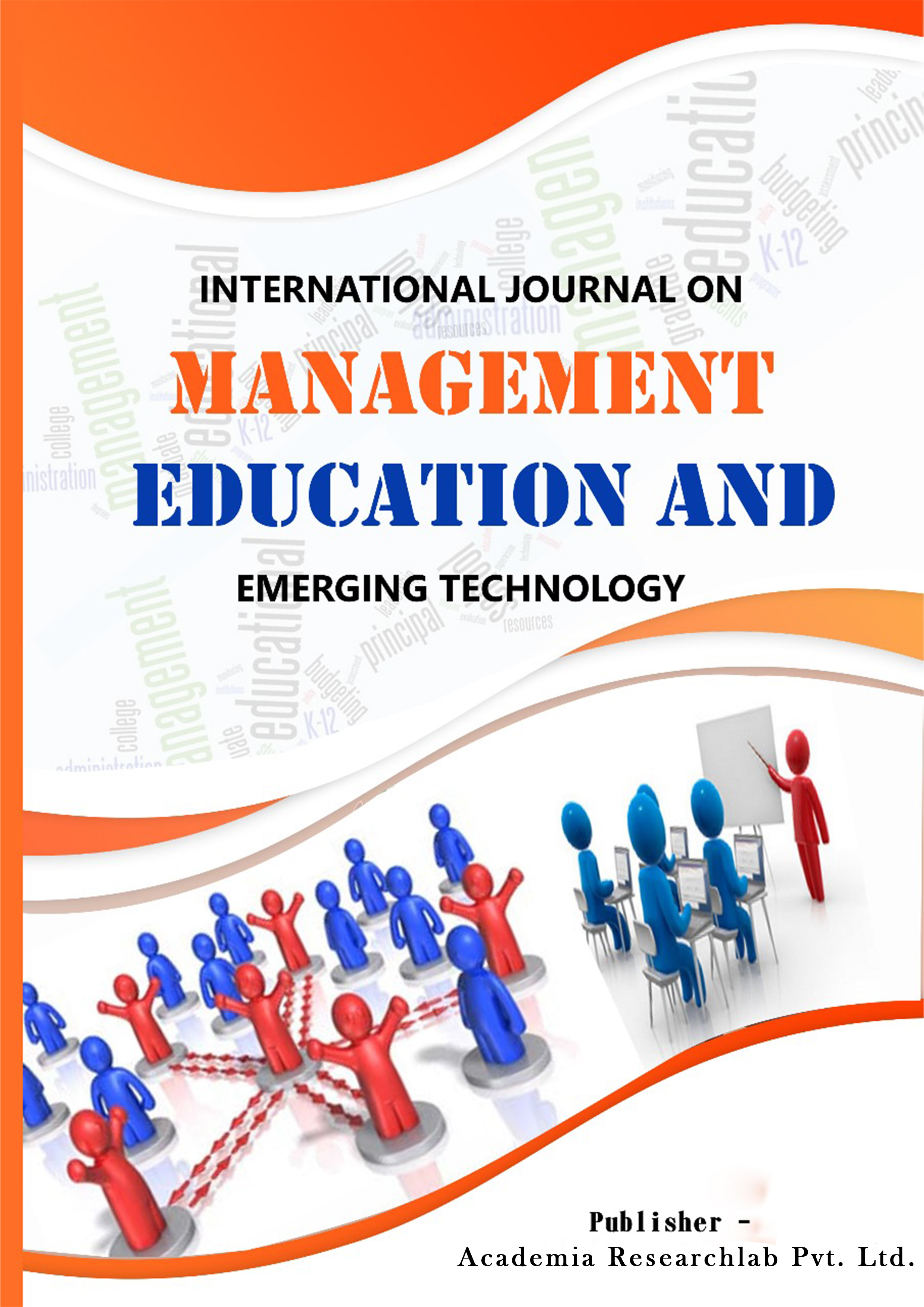Influence of Knowledge Management Practices on Organisational Performance in Libyan Public Industries
Keywords:
Knowledge Management, Organisational Performance, Public Industries, LibyaAbstract
This study explores the nexus between knowledge management practices and organisational performance within the public industries of Libya. Investigating factors such as knowledge sharing culture, leadership support, technology infrastructure, human resource development, organisational structure, external adaptation, cross-functional collaboration, performance measurement, continuous learning, and knowledge leadership, the research explores into their collective impact on organisational effectiveness. The findings underscore the important role of fostering a culture of knowledge sharing, bolstered by supportive leadership. Investments in robust technology infrastructure emerge as crucial enablers for effective knowledge management practices. Human resource development initiatives, coupled with optimized organisational structures and processes, are identified as essential contributors to organisational performance enhancement. Moreover, the study highlights the significance of organisational adaptability to the external environment and the promotion of cross-functional collaboration as drivers of success. Integral to achieving organisational objectives is the implementation of performance measurement mechanisms, facilitating the assessment and improvement of knowledge management. Furthermore, a culture of continuous learning and development is deemed indispensable for sustained organisational growth and competitiveness. Finally, the study underscores the imperative of cultivating knowledgeable leadership, capable of guiding and fostering a conducive environment for effective knowledge management practices. Considering these findings, the study offers a set of recommendations to enhance knowledge management effectiveness and drive organisational performance in Libyan public industries. These recommendations advocate for prioritizing the cultivation of a knowledge-sharing culture and reinforcing leadership support. Additionally, investments in technology infrastructure should be made to facilitate seamless knowledge dissemination and utilisation. Human resource development initiatives should be pursued to enhance employee competencies, while organisational structures and processes should be optimized for efficiency and effectiveness. Moreover, organisations are advised to remain adaptive to the external environment, fostering cross-functional collaboration to capitalize on diverse expertise and perspectives. Implementing robust performance measurement frameworks enables organisations to gauge the efficacy of knowledge management initiatives accurately. Embracing a culture of continuous learning and improvement fosters agility and innovation, ensuring organisational resilience amidst evolving challenges. Lastly, organisations should prioritize the development of knowledgeable leaders who champion knowledge management practices and drive organisational excellence. By adhering to these recommendations, Libyan public industries can fortify their knowledge management practices, thereby augmenting organisational performance and ensuring long-term sustainability in an increasingly competitive aspect.
References
Abdullah, M., & Date, H. (2023). Knowledge management practices in organisations: A review and synthesis. International Journal of Information Management, 63, 102393.
Ahn, T., Ryu, S., & Han, I. (2004). The impact of web quality and playfulness on user acceptance of online retailing. Information & Management, 41(3), 351-363.
Allee, V. (1997). The knowledge evolution: Expanding organisational intelligence. Butterworth-Heinemann.
Al-Shammari, M. (2021). Knowledge sharing in organisations: A literature review and model development. Journal of Knowledge Management, 25(3), 697-715.
Argyris, C. (1993). Knowledge for action: A guide to overcoming barriers to organisational change. Jossey- Bass.
Autry, C. W., Grawe, S. J., Daugherty, P. J., & Richey, R. G. (2021). Understanding the impact of supply chain technological turbulence on technology acceptance: Extending the technology acceptance model. International Journal of Production Economics, 233, 107977.
Barney, J. (1991). Firm resources and sustained competitive advantage. Journal of management, 17(1), 99-120.
Beckman, T. (1997). The current state of knowledge management. In M. D. Cohen & L. S. Sproull (Eds.), Organisational learning (pp. 3-14). Sage.
Bhagat, R. S., McQuaid, S. J., & Toohey, K. (2020). Transforming organisations with information technology: A knowledge management perspective. Journal of Management Information Systems, 16(1), 3-27.
Bogner, W. C., Bansal, T., & Bailey, J. R. (2023). The intangible assets of social enterprises: Developing a multi-dimensional scale. Journal of Business Research, 151, 101-113.
Boyer, K. K., & Olson, J. R. (2020). Organisational buying behaviour and e-commerce: An exploratory investigation of the impact of organisational culture in purchasing. Journal of Business & Industrial Marketing.
Cavaleri, S., & Reed, A. (2020). Interpreting the pre-socratics: A concise critical review. Psychology Press.
Cavaleri, S., & Reed, A. (2020). Introduction: What is social capital? In S. Cavaleri & A. Reed (Eds.), Social capital theory: Towards a methodological foundation (pp. 1-13). Edward Elgar Publishing.
Collis, D. J., & Montgomery, C. A. (1995). Competing on resources: Strategy in the 1990s. Harvard Business Review, 73(4), 118-128.
Conner, K. R., & Prahalad, C. K. (1996). A resource-based theory of the firm: Knowledge versus opportunism. Organisation science, 7(5), 477-501.
Davenport, T. H., & Prusak, L. (2022). Working knowledge: How organisations manage what they know. Harvard Business Press.
Davis, F. D. (1989). Perceived usefulness, perceived ease of use, and user acceptance of information technology. MIS quarterly, 319-340.
Drucker, P.F. (1993). Post-capitalist society. Routledge.
Gold, A. H., Malhotra, A., & Segars, A. H. (2001). Knowledge management: An organisational capabilities perspective. Journal of Management Information Systems, 18(1), 185-214.
Goldratt, E. M., & Cox, J. (1992). The goal: A process of ongoing improvement. North River Press. Handzic, M. (2022). Knowledge management for competitive advantage. Routledge.
Hoopes, D. G., Madsen, T. L., & Walker, G. (2018). Guest editors’ introduction to the special issue: The resource-based view at age 25: Assessing its impact and future. Journal of management, 44(1), 3-12.
Kinney, S. (2022). Knowledge management: An introduction. Routledge.
Leonard, D., & Sensiper, S. (2022). The role of tacit knowledge in group innovation. California Management Review, 40(3), 112-132.
Leonard-Barton, D. (1995). Wellsprings of Knowledge: Building and Sustaining the Sources of Innovation. Harvard Business Press.
Ling, Y., Zhao, Y., & Zheng, H. (2023). Knowledge sharing and organisational performance: A meta-analysis. Journal of Knowledge Management, 27(1), 89-106.
Newell, A., Edelman, G. M., & Tononi, G. (2020). A theory of consciousness. Proceedings of the National Academy of Sciences, 117(42), 26093-26103.
Plato. (360 BC). Theaetetus. Project Gutenberg. (Original work published in Greek)
Polanyi, M. (1966). The Tacit Dimension. Routledge & Kegan Paul.
Prahalad, C. K., & Hamel, G. (2020). The core competence of the corporation. In Strategy process (pp. 345- 364). Routledge.
Ribie’re, V. (2021). Trust and knowledge sharing: The relationship between organisational trust, trust in management, and knowledge sharing in a high-tech organisation. Knowledge Management Research & Practice, 19(2), 324-334.
Richey, R. G., Roath, A. S., Whipple, J. M., & Fawcett, S. E. (2022). An exploratory investigation into the antecedents and effects of technology implementation in retail supply chain management. International Journal of Physical Distribution & Logistics Management.
Sinclair, M. (2016). Knowledge management for government. Routledge.
Smith, A. D., & Rupp, W. T. (2020). The relationship between employee communication and trust in management: A qualitative analysis of the perceptions of public sector employees. Public Relations Review, 46(2), 101840.
Tung, F. C. (2022). Nurses’ intention to use e-logistics systems: an extended technology acceptance model perspective. Information Systems Frontiers, 1-13.
Van de Post, J. C., & DeConing, T. (1997). Reward systems, trust, and knowledge sharing: An exploratory study. Group & Organisation Management, 22(4), 431-455.
von Krogh, G., & Roos, J. (1995). A perspective on knowledge, competence, and strategy. Journal of Management Studies, 32(6), 799-810.
Wernerfelt, B. (1984). A resource-based view of the firm. Strategic management journal, 5(2), 171-180.
Additional Files
Published
How to Cite
Issue
Section
License
Copyright (c) 2024 International Journal on Management Education and Emerging Technology(IJMEET)

This work is licensed under a Creative Commons Attribution-NonCommercial-NoDerivatives 4.0 International License.





